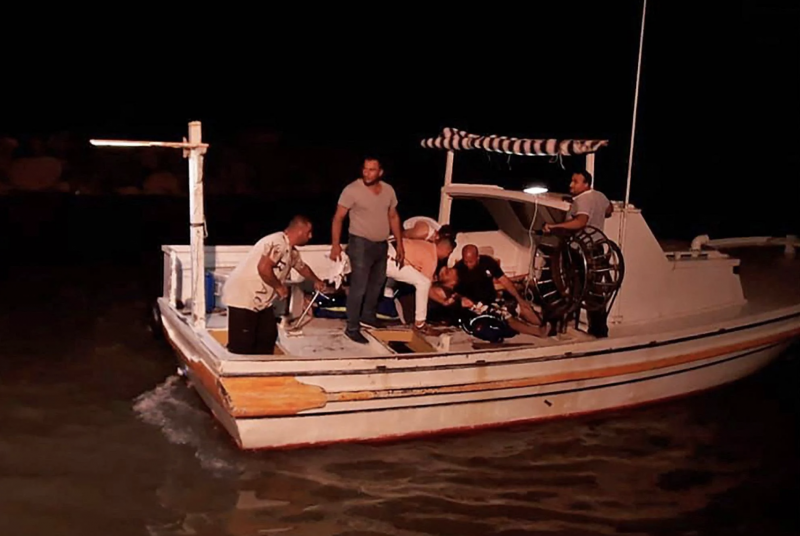
Rescuers in search of survivors and victims off Tartus, on Sept. 22, after the terrible tragedy which left over 100 dead. (Courtesy AFP)
Though Lebanese officials say they have arrested eight people involved in organizing last week’s deadly irregular boat journey — which ended in the deaths of more than 100 people off the coast of the Syrian city of Tartus — residents of the northern Lebanon area where many such journeys originate say many people smugglers are still on the loose.
On Wednesday, Lebanese Army intelligence services reportedly arrested the man who allegedly organized the ill-fated irregular sea crossing, which set off from northern Lebanon.
According to an army statement published Saturday, the man, identified only as B.D., confessed his involvement in the crossing, saying he was the head of a network of people smugglers who organize sea journeys for irregular migrants hoping to leave Lebanon by boat. The network reportedly operates from the area between Minyeh, a northern town, and Arida, a town on the coast just across the border from Syria.
B.D., who reportedly also has a history of drug trafficking, is accused of having made the preparations for the deadly sea crossing attempt last week, for which he charged $5,000 per adult and $2,000 per child, a high-ranking security source told L’Orient-Le Jour. The source requested anonymity as they were not authorized to provide statements to the press. Authorities arrested B.D. in Tripoli.
Seven other people have been arrested in the same case, the security source said.
According to the same source, B.D. is nicknamed the zaim — or “boss” — of the smugglers in his home village of Bibnine in Akkar. He is said to have already amassed a fortune from people smuggling, which involves charging people exorbitant sums of money in return for guiding them on irregular journeys out of Lebanon. From the last sea crossing alone, which ended tragically in Tartus, he reportedly has pocketed half a million dollars, the security source said.
L’Orient-Le Jour could not independently confirm this sum.
Exorbitant prices
However, a resident of Bibnine, who requested anonymity due to the sensitivity of the situation, told L’Orient-Le Jour that B.D. is not the only smuggler in the region, and that other individuals from Akkar are in contact with Syrian families to offer them irregular passage to Europe.
Those smugglers’ main sales pitch: The sea crossing from the northern coasts of Lebanon is considerably cheaper and less complicated than the crossing by land through Turkey.
Lebanese journalist Jana el-Douhaybi, who is from the northern Lebanese city of Tripoli and closely follows the area’s people smuggling networks, told L’Orient-Le Jour that most Syrians who take the sea from Lebanon are not refugees. Rather, she said, they reside in Syria but have crossed the border into Lebanon in order to join the dangerous sea crossings from their launch points near Arida and Minyeh.
These passengers, who have crossed to Lebanon to embark on the risky boat journeys, who are the lifeblood of this people smuggling network, Douhaybi said.
Because of this demand to leave by sea, prices for the journeys have increased, reaching $5,000 to $7,000 per person, which forces some families to pay nearly $40,000 to cross to Europe, after selling all their belongings, according to Douhaybi.
Human traffickers, not just smugglers
Residents in northern Lebanon also suspect the existence of complicity within some Lebanese law enforcement agencies.
The security source told L’Orient-Le Jour such talk was false, claiming that these are rumors circulated by smugglers in order to extract extra money from hopeful travelers, under the pretext that they have to pay bribes. L’Orient-Le Jour could not confirm this claim.
Meanwhile, why are smugglers often reportedly released after only a few days of detainment? According to the same security source, it is the judiciary’s job to keep criminals locked up and to judge them. However, the slow judicial procedures, as well as a weeks-long judges’ strike, has complicated this task.
Zaher Matraji, a member of a lawyers syndicate in Tripoli who closely following this case, said that much stricter measures must be taken to put an end to dangerous people smuggling.
“Many families wishing to emigrate are prevented from doing so by the army, but they turn again to the smugglers as soon as they are released by the authorities,” Matraji said.
According to the lawyer, the problem lies in the law, which considers these smugglers as mere facilitators and organizers of these risky crossings. Rather, he said, Lebanon’s legal system should consider them human traffickers and impose much heavier penalties.
This article was originally published in French in L'Orient-Le Jour. Translation by Joelle el Khoury.
